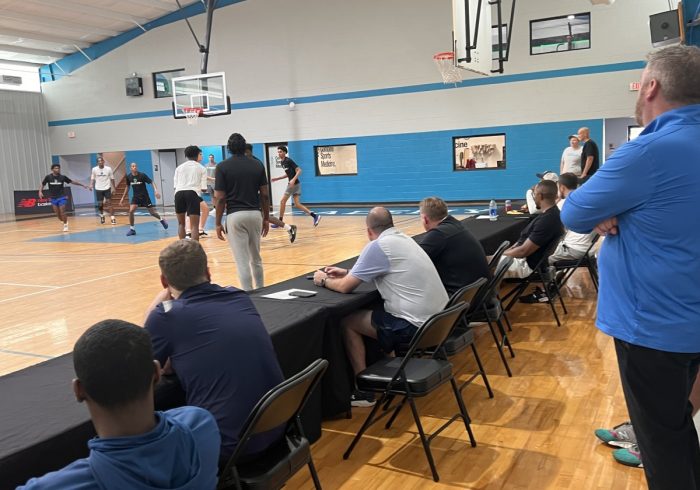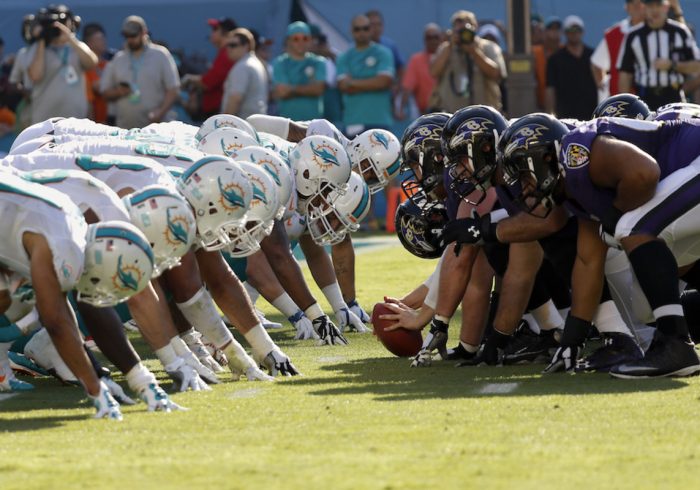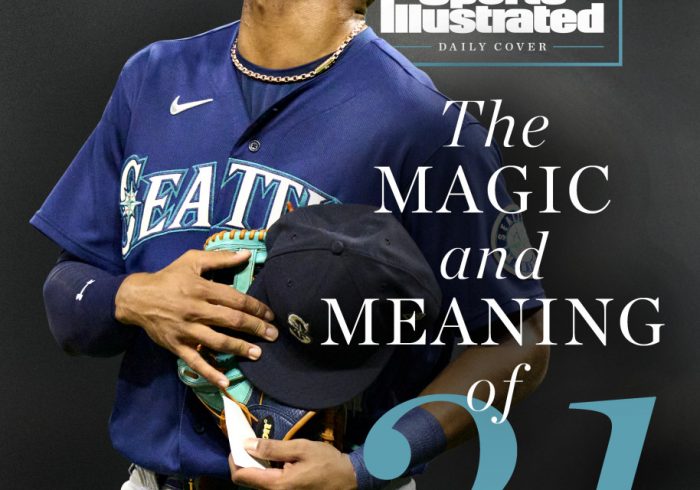Good morning, I’m Dan Gartland. You wanna see a car go really fast?
In today’s SI:AM:
🏎️ The coolest moment of the NASCAR season
🔔 The longest-tenured member of the Phillies’ lineup
If you’re reading this on SI.com, you can sign up to get this free newsletter in your inbox each weekday at SI.com/newsletters.
You really have to see this
After an action-packed NFL Sunday, it takes something truly special for me to not lead this newsletter with football. But you don’t even have to be a NASCAR fan to recognize that what Ross Chastain did in yesterday’s race at Martinsville was truly incredible.
Yesterday was the last race of the Round of 8 of the NASCAR playoffs. Only the top four drivers in the standings after Martinsville would still be in the running for the championship—and as the final lap began, Chastain wasn’t poised to be one of them. He had entered the race second in the standings but was running 10th as the final lap began. If he didn’t make a big move, he was going to see Denny Hamlin claim the final spot in the next playoff round.
And so Chastain made a big move. The biggest move. He floored the accelerator and turned into the wall, pinballing around the final two turns 70 mph faster than everybody else and going from 10th place to fifth. He passed Hamlin and earned a spot in the final four.
“It looks like a video game,” Jeff Gordon said on commentary. “It doesn’t look real; he’s going so fast.”
The reason it looked like a video game is because that’s exactly where Chastain got the idea.
“Oh, played a lot of NASCAR 2005 on the GameCube with [younger brother] Chad growing up,” he said. “You can get away with it. I never knew if it would actually work.
“I mean, I did that when I was 8 years old. I grabbed fifth gear, asked off of two on the last lap if we needed it, and we did. I couldn’t tell who was leading. I made the choice, grabbed fifth gear down the back. Full committed. Basically let go of the wheel, hoping I didn’t catch the Turn 4 access gate or something crazy. But I was willing to do it.”
The daring move paid off for Chastain and for his team, Trackhouse Racing. As Madeline Coleman detailed in a Daily Cover story earlier this month, this is Trackhouse’s first NASCAR season as a fully autonomous team, but it’s challenging the biggest names in the sport thanks to its out-of-the-box approach to racing. It doesn’t get any more out-of-the-box than what Chastain did yesterday.
The best of Sports Illustrated
In a lot of ways, Rhys Hoskins is the key to understanding this Phillies team, Emma Baccellieri writes in today’s Daily Cover:
It can be tricky to summarize just what Hoskins represents to Phillies fans, with a history that holds plenty of complications, quirks and contradictions. Perhaps the best way to capture it is this: No one has received a more even mix of cheers and boos at Citizens Bank Park this October. (Shortly before his mammoth home run in Game 3 of the NLDS, a fan yelled up to the press box, “Trade Hoskins!” seemingly frustrated with a costly error the first baseman made in the previous game.) He has undoubtedly provided some of the biggest highlights on that field this month. Yet there might not exist a highlight big enough to fully erase the angst, the frustration, that keeps fans occasionally booing.
Conor Orr argues that the NFL needs to change its celebration rules in the wake of D.J. Moore’s costly penalty yesterday. … Pat Forde wrote about the shameful scene inside the tunnel after Michigan beat Michigan State. … Game 3 in Philadelphia will be a homecoming for Pennsylvania native Chas McCormick, Stephanie Apstein writes.
Around the sports world
Michigan State suspended four players after the brawl inside the tunnel after Saturday’s game against Michigan. … Eagles receiver A.J. Brown said he was “kind of upset” with how he played yesterday even though he scored three touchdowns. … Rams receiver Cooper Kupp went down with an injury late in the team’s loss to the 49ers. … The Lakers finally got their first win of the season, beating the Nuggets at home. … Christian McCaffrey joined a small group of players to run for, catch and throw a touchdown in one game.
The top five…
… things I saw yesterday:
5. Derrick Henry’s 41-yard gain on the second carry of his 219-yard game.
4. This goal from a low-level soccer game in Belgium.
3. The view of Ross Chastain’s move from inside the car.
2. Jayson Tatum’s reaction to Grant Williams’s Halloween costume.
1. PJ Walker’s game-tying Hail Mary pass to D.J. Moore.
SIQ
On this day in 1950, who became the first Black player to appear in an NBA game?
- Earl Lloyd
- Chuck Cooper
- Nat Clifton
- Jim Tucker
Friday’s SIQ: Which league hired the first two women to officiate games in major American men’s sports?
- NFL
- NBA
- NHL
- MLB
Answer: The NBA. Violet Palmer and Dee Kantner had previously reffed games in the WNBA and NBA Summer League and were added to the NBA staff after a successful preseason tryout.
While Jerry West (then the executive vice president of the Lakers) called the move “a great coup for the NBA,” support for Palmer and Kantner was not unanimous.
“I hope they don’t bring ’em,” Charles Barkley told reporters after a preseason game that Kantner had worked (during which, the Los Angeles Times reported, players could be heard making crass jokes). “That’s my opinion. I don’t have to give you a reason why. I treat all officials the same—like dogs. Everybody is entitled to their own opinion. I just hope they don’t have women officials. It’s the principle of the thing. I wouldn’t want a man doing a WNBA game.”
Palmer made additional history years later in becoming the NBA’s first openly lesbian referee.
Palmer and Kantner paved the way for other women to receive opportunities in officiating major men’s sports. Last year, Natalie Sago and Jenna Schroeder became the first two women to officiate the same NBA game. This season, the NBA added two more women to its roster of full-time officials (Cheryl Flores and Dannica Mosher), bringing the total number of female refs to eight, an all-time high. The NFL has three women working as on-field officials: Sarah Thomas, Maia Chaka and rookie Robin DeLorenzo. There has never been a female umpire in MLB and only nine in the history of the minors, although two (Jen Pawol and Isabella Robb) worked games this year. The NHL has also never had a woman put on the stripes, but a group of 10 women who started calling games in the AHL last season are hoping to change that.
From the Vault: Oct. 31, 1983
As the Victor Wembanyama hype train barrels down the tracks, perhaps it’s worthwhile to look to Ralph Sampson as a sort of cautionary tale.
On the eve of his rookie season, Sampson appeared on the cover of SI with a story written by Anthony Cotton. The 7’4″ Sampson had excelled at Virginia and was a no-brainer for the Rockets to take with the No. 1 pick in the 1983 draft.
“[F]rom the moment Sampson stepped onto the court the first day of rookie camp, it was obvious that he possessed immense potential,” Cotton wrote. “He was one of the better outside shooters, while in drills designed to emphasize the quick transition from offense to defense and vice versa, Sampson, gobbling up the court with his long, loping strides, was rarely caught out of position.”
While Sampson struggled in preseason action in his first matchups against NBA talent, people around the league weren’t worried about his ability to adapt to the pro game. Indeed, once the games started for real, Sampson didn’t look out of place at all. He averaged 21.0 points and 11.1 rebounds per game as he won the Rookie of the Year.
The reason I bring up Wembanyama, though, is that, in the middle of his fourth straight All-Star season in 1986–87, Sampson injured his knee and was never the same. The last season in which he played even half of his team’s games was ’88–89, when he was 28. Guys the same size as Sampson and Wembanyama (and Yao Ming and Gheorghe Mureșan and Arvydas Sabonis) are often plagued by nagging injuries. Wembanyama is a generational talent. We can only hope that, thanks to advances in the way athletes train, he’s able to avoid the same fate as some of his predecessors.
Check out more of SI’s archives and historic images at vault.si.com.
Sports Illustrated may receive compensation for some links to products and services on this website.



